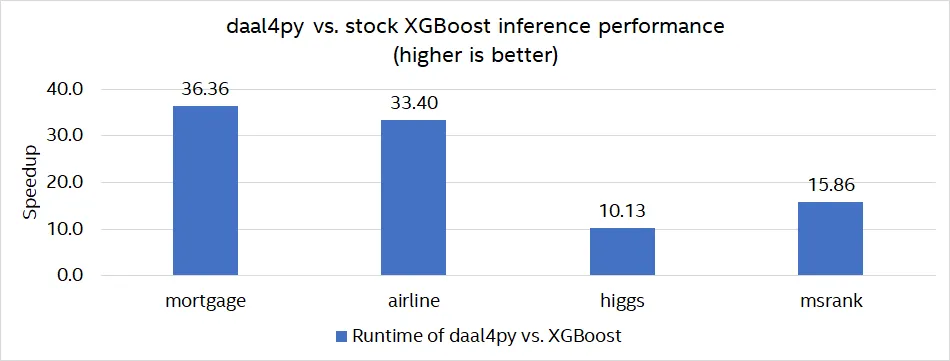Serving GBT models from other libraries
Introduction
The Extension for Scikit-learn* can be used to accelerate computation of predictions (also known as “inference”)
from GBT (gradient-boosted decision trees) models produced by other libraries such as XGBoost, by
converting those models to class daal4py.mb.GBTDAALModel which offers faster methods
daal4py.mb.GBTDAALModel.predict() and daal4py.mb.GBTDAALModel.predict_proba().

Example speedups in predictions compared to prediction method in XGBoost on Intel Xeon Platinum 8275CL (see blog post).
Model objects from other GBT libraries can be converted to this daal4py class through function
daal4py.mb.convert_model in the model builders (mb) submodule, which can also convert
logistic regression models (Serving Logistic Regression from Other Libraries). See About daal4py
for more information about the daal4py module.
Currently, model builders from daal4py can work with GBT model objects produced by
the following libraries, both in their base booster classes and their scikit-learn-compatible classes:
Models from other libraries are supported indirectly by using TreeLite as an intermediate
format - for example, objects from scikit-learn such as sklearn.ensemble.HistGradientBoostingClassifier
can be converted to daal4py by first converting them to TreeLite and then converting
the resulting object to daal4py.
Acceleration is achieved by a smart arrangement of tree representations in memory which is optimized for the way in which modern CPUs interact with RAM, along with leveraging of instruction set extensions for Intel hardware; which can result in very significant speed ups of model predictions (inference) without any loss of numerical precision compared to the original libraries that produced the models.
In addition to regular predictions, daal4py can also accelerate SHAP computations,
for both feature contributions and feature interactions.
Example
Example converting an XGBoost model:
import numpy as np
import xgboost as xgb
import daal4py
from sklearn.datasets import make_regression
X, y = make_regression(n_samples=100, n_features=10, random_state=123)
dm = xgb.DMatrix(X, y)
xgb_model = xgb.train(
params={"objective": "reg:squarederror"},
dtrain=dm,
num_boost_round=10
)
d4p_model = daal4py.mb.convert_model(xgb_model)
np.testing.assert_allclose(
xgb_model.predict(dm),
d4p_model.predict(X),
rtol=1e-6,
)
np.testing.assert_allclose(
xgb_model.predict(dm, pred_contribs=True),
d4p_model.predict(X, pred_contribs=True),
rtol=1e-6,
)
np.testing.assert_allclose(
xgb_model.predict(dm, pred_interactions=True),
d4p_model.predict(X, pred_interactions=True),
rtol=1e-6,
)
Example converting a scikit-learn model using TreeLite as intermediate format:
import numpy as np
import treelite
import daal4py
from sklearn.datasets import make_regression
from sklearn.ensemble import HistGradientBoostingRegressor
X, y = make_regression(n_samples=100, n_features=10, random_state=123)
skl_model = HistGradientBoostingRegressor(max_iter=5).fit(X, y)
tl_model = treelite.sklearn.import_model(skl_model)
d4p_model = daal4py.mb.convert_model(tl_model)
np.testing.assert_allclose(
d4p_model.predict(X),
treelite.gtil.predict(tl_model, X).reshape(-1),
rtol=1e-6,
)
More examples:
Blog posts:
Notes about computed results
The shapes of SHAP contributions and interactions are consistent with the XGBoost results. In contrast, the SHAP Python package drops bias terms, resulting in SHAP contributions (SHAP interactions) with one fewer column (one fewer column and row) per observation.
Predictions for regression objectives are computed in the link scale only (what XGBoost calls “margin” and LightGBM calls “raw”).
Limitations
Models with categorical features are not supported.
Multi-class classification is only supported when the logic corresponds to multinomial logistic loss instead of one-vs-rest.
Multioutput models are not supported.
SHAP values cannot be calculated for multi-class classification models, nor for CatBoost regression models from loss functions that involve link functions (e.g. can be calculated for ‘RMSE’, but not for ‘Poisson’).
Objectives that are not for regression nor classification (e.g. ranking) are not supported.
Random forests converted to TreeLite can be supported when they are for regression or binary classification, but not when they are for multi-class classification. In the case of binary classification, random forests are converted as regression models since they do not apply a link function to predictions the same way gradient boosting models do.
Documentation
See the section about model builders in the daal4py API reference
for full documentation.